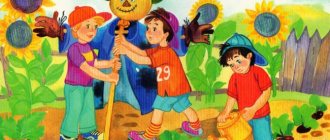Requirements for the daily routine in preschool educational institutions according to SanPiN
The standard daily routine in kindergarten is designed for 12 hours, which the child spends within the preschool walls. Any adjustments are made taking into account climatic conditions, geographical location, and other factors. The regime is drawn up in accordance with sanitary and epidemiological rules and regulations SanPiN 2.4.12660–10. Key points:
- The kindergarten provides four meals a day with a time interval of 4 hours between meals.
- There are 2 walks in the fresh air - in the morning and after a nap. In total, walking with children requires 3–4 hours. The time spent outside is reduced at temperatures below –15 °C and wind speeds of 7 m/s.
- According to the daily schedule, nap time is 2–2.5 hours, while the teacher must be present in the bedroom and monitor the sleeping children.
- It is required to ventilate the room for less than 10 minutes. every 90 minutes If there are no children, arrange ventilation 30 minutes in advance. before they arrive from the street or classes. The air temperature should not drop more than 2–4 °C; it is important to avoid drafts.
- Bed linen in kindergarten must be changed at least once a week (according to the schedule).
- In the cold season, the teacher should meet the children in the morning in the group, in warm weather - outside (at the group site).
Diet
| Time | Eating | Approximate menu |
| 8:30 | Breakfast | A hot dish (milk porridge, cottage cheese casserole, egg omelet), tea or cocoa, a sandwich with butter and cheese. |
| 10:00 | Lunch | Drink with or without fruit. |
| 12:00 | Dinner | First course (borscht, soup), second (side dish with meat or fish), salad or vegetables, cold drink. |
| 15:00 | Afternoon snack | Baking (bread), drink. |
| 18:00 | Dinner | Meat or fish dish, cottage cheese, drink. |
Kindergarten classes
In kindergarten, they develop speech skills, broaden their horizons, introduce them to the basics of mathematics and writing, instill a love of creativity and culture, and provide new knowledge. In the absence of medical contraindications, classes are conducted in the following areas:
- physical training;
- music, singing;
- art;
- mathematics;
- development of speech, logic, fine motor skills;
- preparation for school.
In kindergarten, independent games are held, when children communicate with peers, make friends, and relax. There are no more than 3 classes per day in kindergarten, with a break between them of at least 10 minutes. Lesson duration:
- junior group (children 3–4 years old) – 10 min.;
- middle group (4–5 years) – 15 minutes;
- senior group (5–6 years old) – 20 min.;
- preparatory group (6–7 years old) – 30 min.
The main components of the daily routine of children of different ages
The child’s daily routine should include the following mandatory elements:
- meal time. A child, depending on his age, must eat a certain number of times a day. The intervals between feedings are also important;
- time to sleep. The nervous system of a child, compared to an adult, is at the stage of formation, so exhaustion occurs faster, requiring recovery. Also, a small organism spends more energy on all vital processes than an adult. The need for sleep decreases as the child grows.
- time spent in the fresh air. It may include walking, sleeping, playing;
- time for compulsory educational activities. In a children's group and at home from a toddler age;
- free time. It becomes important when the baby already knows how to do something on his own. At this time, the child himself chooses his type of activity. Free time is important for processing received information and realizing creative abilities.
Daily routine in kindergarten
The daily routine in kindergarten depends on the age of the child, the specialization of the preschool educational institution, and other factors at the discretion of the teacher (methodologist, management). Activities that require increased mental stress for children are carried out in the first half of the day, alternating with physical education, music, and fine arts. This is important in order not to overload the child, to make him a comprehensively developed personality to the delight of dad and mom.
Nursery group (2–3 years)
It is important to follow the daily routine in kindergarten from the nursery on. This is necessary so that the kids adapt faster. It is important to speed up the process of getting used to the teachers and nanny so that the child does not worry and goes to kindergarten with joy every morning. Approximate daily schedule:
| Time | Daily regime |
| 7:00–8:00 | Reception of babies |
| 8:00–8:20 | Breakfast |
| 8:20–9:00 | Independent games in a group |
| 9:00–9:30 | Preparing for the walk |
| 9:30–11:30 | Street games |
| 11:30–11:45 | Return to the group, preparation for lunch |
| 11:45–12:15 | Dinner |
| 12:15–12:30 | Preparation for sleep |
| 12:30–15:00 | Quiet hour |
| 15:00–15:15 | Waking up after a nap |
| 15:15–15:30 | Afternoon snack |
| 15:30–15:45 | Stand alone games |
| 15:45–16:15 | Group classes |
| 16:15–16:30 | Preparing to go outside |
| 16:30–18:00 | Walk |
Junior group (3–4 years old)
| Time | Daily regime |
| 7:00–8:20 | Reception of children, morning exercises, games |
| 8:20–8:50 | Preparing for breakfast, eating |
| 8:50–9:20 | Games, preparation for classes |
| 9:20–10:00 | Classes |
| 10:00–10:20 | Preparing for the walk |
| 10:20–12:20 | Outdoor recreation |
| 12:20–13:00 | Dinner |
| 13:00–15:15 | Quiet hour |
| 15:15–15:45 | Awakening, games, air procedures |
| 15:45–16:00 | Afternoon snack |
| 16:00–16:30 | Games, physical activity |
| 16:30–16:50 | Gathering outside |
| 17:00–18:00 | Walk |
Middle group (4–5 years old)
| Time | Daily regime |
| 7:00–8:20 | Reception of pupils, gymnastics, outdoor games |
| 8:20–8:50 | Preparing for breakfast, eating |
| 8:50–9:50 | Preparation for classes, classes |
| 9:50–11:50 | Gathering outside for a walk |
| 11:50–12:15 | Return to the group, preparation for lunch |
| 12:15–12:50 | Dinner |
| 12:50–13:00 | Preparing for sleep |
| 13:00–15:00 | Quiet hour |
| 15:00–15:25 | Awakening, games, air procedures |
| 15:25–15:50 | Afternoon snack |
| 15:50–16:30 | Games, physical activity, music lessons, educational program |
| 16:30–18:00 | Gathering outside for a walk |
Senior (5–6 years old)
| Time | Daily regime |
| 7:00–8:30 | Reception of pupils, duty, gymnastics, outdoor games |
| 8:30–8:55 | Preparing for breakfast, eating |
| 8:55–10:50 | Developmental activities |
| 10:50–12:25 | Preparing for a walk, walk |
| 12:25–12:40 | Returning from the street, preparing for lunch |
| 12:40–13:15 | Dinner |
| 13:15–15:00 | Getting ready for bed, quiet time |
| 15:00–15:25 | Waking up, personal hygiene procedures |
| 15:25–15:40 | Afternoon snack |
| 15:40–16:20 | Games, physical education, labor, fine arts |
| 16:30–18:00 | Outdoor recreation |
Preparatory group (6–7 years old)
| Time | Daily regime |
| 7:00–8:30 | Reception of pupils, duty, gymnastics, outdoor games |
| 8:30–8:50 | Preparing for breakfast, eating |
| 8:50–9:00 | Getting ready for classes |
| 9:00–11:05 | Preparing a preschooler for school |
| 11:05–12:35 | Gathering for a walk, walk |
| 12:35–12:45 | Return to the group |
| 12:45–13:15 | Dinner |
| 13:15–15:00 | Quiet hour |
| 15:00–15:25 | Waking up, maintaining personal hygiene |
| 15:25–15:40 | Afternoon snack |
| 15:40–16:30 | Games, work, fine arts, communication with peers, gathering outside |
| 16:30–18:00 | Outdoor recreation |
LiveInternetLiveInternet
Tuesday, August 24, 2010 08:40 + in the quote book Daily routine and menu for the nursery group of a kindergarten Growing up, kids gradually join adult life, the laws of which are sometimes very different from the carefree pastime at home. Of course, having plunged into the world of kindergarten, it will be difficult for a child to immediately accept and understand the rhythm of his life. Therefore, if you know for sure that after a few months your baby will be going out into the world, try to gradually and very gently introduce her to the nursery daily routine and, perhaps, even make some adjustments to her usual home schedule. Regime for the nursery group for children (1.5 -2 years old) 8:00 morning exercises (running, jumping, games). 8:10-8:40 breakfast, for which the children are offered cottage cheese soufflés and casseroles (1-2 times a week), milk kazhi, steamed omelet or egg porridge with fresh vegetable salad, a warm drink. 9:10-9:20 and 9:20-9:30 classes aimed at the diversified development of the child: music, physical education, dancing, sensory skills with elements of mathematics, drawing, modeling, knowledge of the surrounding world, speech development. In this case, two activities should not overlap or repeat each other, so as not to tire the child. It is optimal when classes to develop thinking, imagination, and speech are replaced by fast and active games, dancing, and physical exercises. 9:30-11:30 walk. Outdoor games. 11:30-12:00 lunch. At this time, children are given pureed vegetarian soups, steamed meat dishes (meatballs, cutlets) or boiled fish, side dishes in the form of cereal dishes or mashed potatoes, salads from fresh vegetables (daily). For the third course every day, children receive fortified drinks (compote, jelly). 12:15-15:00 nap. 15:00-15:30 gradual rise, carrying out hygiene and health measures (light warm-up). 15:30-15:45 afternoon snack, which can consist of a drink (milk, kefir, barley coffee drink and flour product (loaf with butter or jam, waffles, cookies). 15:45-16:45 time of active wakefulness. During this during this period, classes are held for the diversified development of the child, but they in no way repeat the morning ones. For example, if in the morning there was drawing and dancing, then in the evening you can sing songs or do modeling. 16:45-17:15 dinner. For which the children are offered dairy products porridge, pureed vegetable dishes, egg omelet with fresh vegetable salad, etc. 17:15 walk, active games, reading fairy tales and just chatting in a pleasant and friendly company.At the same time, dinner in the kindergarten should not be the last meal in the daily diet baby, and in the evening (19:00-20:00) at home the child must be fed a home-made dinner.It is best if the evening meal is vegetable dishes: stew of a mixture of vegetables, stewed cabbage, carrot or beet caviar, vegetable cottage cheese casserole soufflés and puddings or milk porridges. This healthy meal will be perfectly complemented by fermented milk products (kefir, yogurt, fermented baked milk), fresh fruits and juices, the abundance of which, unfortunately, the kindergarten menu cannot boast of. Deciding on the main kindergarten dishes is a task of increased complexity, since all the “basic” ones are collected in a thick book called “Collection of recipes for dishes for early and school age” and their number exceeds well over a thousand. The management, nutritionist and cook of each individual preschool institution are free to choose from this list those dishes whose recipes correspond to the kindergarten’s food supplies and optimally satisfy the needs and, of course, the taste requirements of the children. Practice shows that the set of “favorite” dishes in kindergartens can differ markedly. However, do not be alarmed, because tomato and cucumber salad, mashed potatoes, vegetarian borscht and steamed meat cutlet, which your baby is used to at home, occupy a worthy place on the menu in almost all kindergartens. https://www.razumniki.ru/rasporyadok_dnya_v_detsadu.html
Series of messages “children’s”:
Part 1 - children's furniture Part 2 - hairstyles ... Part 16 - Weekly menu for children 1-1.5 years old for home feeding Part 17 - Nutrition for children 1-1.5 years old Part 18 - Daily routine and menu for the nursery group kindergarten Part 19 - Daily routine in the nursery group Part 20 - Entertaining, educational and educational sites only for children... Part 44 - Finger painting. For activities with children from 1 to 2 Part 45 - Plasticine modeling for children Part 46 - Poems for the New Year
Tags:
children's regime and nutrition
Cited 6 times Liked by: 1 user
Like share
0
Like
- 1
I liked the post - Quoted
- 0
Saved
- Add to quote book
- 0
Save to links
Liked1
0
How is a daily routine beneficial for a child?
The benefits of a routine are determined by physiological and psychological aspects, which are the basis for creating a daily routine:
- the benefit from the physiological side is the development of conditioned reflexes, with the help of which the body adapts to existing conditions. The child is prepared to perform the necessary tasks and does them without unnecessary stress. Those. energy is saved and distributed evenly for all necessary activities;
- from a psychological point of view, the child’s nervous system needs a stable environment, which, with its predictability, gives a feeling of peace and reliability. This, in turn, creates a favorable background for the child’s development, a deeper understanding of the actions performed and the development of skills.









